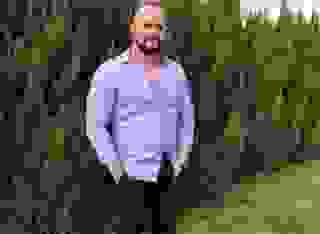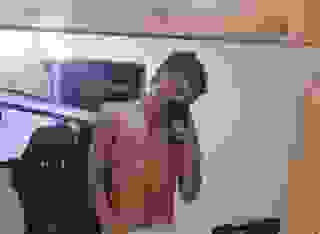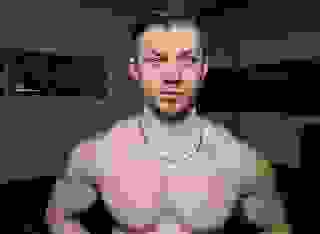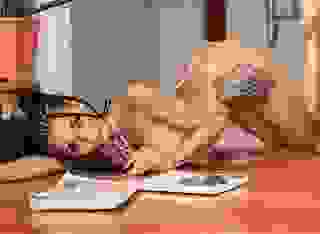- Gay Male
- After the End Ch. 18
Note: You can change font size, font face, and turn on dark mode by clicking the "A" icon tab in the Story Info Box.
You can temporarily switch back to a Classic Literotica® experience during our ongoing public Beta testing. Please consider leaving feedback on issues you experience or suggest improvements.
Click hereAuthor's note:
This is the sixth chapter of After the End - Part 3, the final novel in my dystopian erotic romance trilogy. If you enjoy intensely provocative sex with a power play twist, handsome male heroes in emotionally satisfying relationships, and unconventional happily ever afters -- you are in the right place! These books are full-length, publication-quality, and currently being offered free of charge. :)
Descriptions of each book can be found in my bio by clicking my user name. Feel free to drop in on specific chapters or sections based on your mood or interest, but the dramatic tension is strongest if you start from the beginning of Part 1. As always, I appreciate hearing your reactions and feedback. It truly does help me create the best stories that I can for readers to enjoy.
Content warning: This chapter graphically depicts a character experiencing an imminently life-threatening emergency. This chapter also depicts a character verbally sharing a sexual fantasy that involves kidnapping, captivity, non-consensual bondage, sexual abuse, and rape. Please proceed with caution and be gentle with yourself if this content could be upsetting for you.
Tags for this chapter include: #bisexual male, #future, #dystopia, #novel, #romantic, #married, #male submissive, #submission, #polyamory, #triad
_______________
Avery:
It's rarely just one disaster that'll end your life. Humans have evolved to be survivors, generation after generation. We're actually pretty hard to kill. Yeah, once in a while you'll be the unlucky one who takes a direct hit from storm-hurled wreckage or a charging animal. But we can last days without a drop of water and weeks without a morsel of food -- enough time that we can usually find a way to safety. Our brains give us as much of an advantage as our upright gait and nimble fingers. Looking back in history, even the most twisted leaders who wanted to wipe out large populations had to mobilize incredible resources to do so. Most injuries, illnesses, and venomous bites -- in themselves -- are survivable. Same goes for famines, floods, and wildfires.
It's when challenges start to stack up that people lose their lives. Storms that wash out roads and destroy power generators. Infections that cripple our labor pool. Breakdowns in the tenuous supply chain from mining to manufacture to trading post. Months without rain when the milk and eggs dry up. Blight striking one crop, insects another, and unseasonable frosts a third. Treatable wounds without the necessary materials or medical staff. Too many stresses and strains and shortages, and eventually neither mind nor muscle can compensate.
I know very well how easy it is to die when several kinds of bad luck compound each other. I've seen it happen to family, friends, and complete strangers I found rotting or still warm. And right now, as I took stock of my situation in these darkening, unfamiliar woods, there was a blood-curdling chance it was about to happen to me.
If only one thing had gone differently, I probably would have been ok. If we'd taken a different route to scout potential trading opportunities in the lesser-known territories northeast of Fort Laurel, for example, or if we'd brought a few more gunners. If we hadn't stopped just where we did to regroup before heading home and been caught completely off guard by a band of thieves we'd never encountered before. If I hadn't set down my pack to stow some of the goods we'd purchased and had to leave it behind when the shooting started. If I hadn't leapt that bank while sprinting for a better defensive position and landed very wrong on my ankle. If I hadn't ended up cut off from my companions, not even knowing whether they had survived. If the bright early-January day hadn't turned drizzly and dismal, saturating my insufficient layers.
I'd managed to make it to cover, and my bullets found my pursuers before theirs found me, but my right ankle was fucked. The pain was intense when I put any weight on my foot, and the swelling looked ugly. After the sounds of attack faded into the distance, I tried to hobble in the direction I thought was home, but my snapped joint kept giving out, and I was terrified something was broken or badly torn. I couldn't catch up to any remaining comrades, and I couldn't call for them, since I'd just as likely attract the bandits instead. With limited ammo left, I'd be unable to fight off more than three or four, and I sure as hell couldn't outrun them anymore.
Daylight was waning fast. After the deceptively mild afternoon, the temperature was dropping alarmingly, which meant time was running out for me to make whatever preparations I could to survive until help arrived. If any did. Every minute that went by made it less likely that others from Fort Laurel would be able to find or reach me until tomorrow. Roaming the woods was risky enough by day. In the dark, with enemies of unknown strength at large, it was practically suicidal without a serious commitment of force.
My most dangerous enemy now was hypothermia. It isn't that cold here even in winter; it wasn't likely to get much below fifty degrees tonight. Which doesn't sound that bad, but combined with damp clothing, lack of shelter, and the inability to move much, could easily become lethal. Humans, like all mammals, only function at relatively high internal temperatures. We produce heat continuously, yet we conserve it poorly, so it's constantly being lost, and moisture against the skin accelerates the process. Another hour or two out here, and my body would cool below a biologically sustainable level. The insulating clothing I carried for just such an emergency was, of course, in the pack I didn't have.
We drilled for these types of situations. The most important thing was not to panic. I knew that, yet fear was rising with every beat of my heart. I could almost see my own warmth radiating away as my blood pulsed too quickly -- warmth I couldn't replace, and which I literally couldn't live without. Once it was gone, oxygen would no longer be able to circulate to my organs and tissues. So they would die. And then I'd die.
The damning questions chased themselves through my brain: Why hadn't I grabbed my fucking gear before I scrambled into the underbrush? Why hadn't I noticed we were about to be attacked? Why hadn't I stuck closer to the others? Why had I thought I could make that jump? How the hell was I supposed to keep from freezing when I couldn't even walk?
I had to make some decisions if I wanted to get out of this alive. I was already starting to shiver, and the whirling thoughts weren't going to protect me. I forced myself, just for a moment, to stop scrolling through the what-ifs and the many things I should have done differently. I placed my attention only on the breath I was taking and made it slow: all the way in, all the way out, like Julian and Maurice had taught me. Immediately a bit of space opened up in my crowded head, so I did it a few more times.
The threat was just as present, but now it seemed possible to take some action. What was it Julian always said during trainings? Don't think about the tools you don't have. Think about the options you do have.
I surveyed my surroundings again. I did have some things still in my pockets. I had rations I could eat to help keep my metabolism running. I had a little water in the canteen clipped to my belt. I had a flashlight, which wouldn't show me much once the last of the sun's rays faded, but would be enough to locate materials for shelter or fire.
I tried to remember whether I'd passed any buildings or features that would preserve my body heat better than my current location. It was possible I could get a fire going with the striker and tinder I had, even in the light rain, if I found the right place and enough kindling and fuel that had stayed relatively dry. It was going to be damned difficult to search for and carry the necessary materials with only one working leg, though. A fire would have to be pretty hot to counteract the January chill without a shelter to contain it, plus it would risk bringing attackers to my position. With my limited mobility, I might have a better shot hunkering down in as much insulation as I could put together. I didn't have a hatchet, but I did have my knife, so I could at least cut small branches.
It wasn't pretty, and it wasn't fun, but with me hobbling, hopping, and crawling around like the wounded animal I was, I managed to build a simple shelter on a slope between several trunks. I found the slim spine of a young dead tree and propped it at an angle over a thick carpet of fallen foliage, then arranged a skeleton of shorter straight branches on either side. Lastly, I piled live branches and as many leaves and pine needles as I could over top. The exertion produced plenty of excess thermal energy, and when I backed into my tunnel, that energy warmed the vegetation around me and the branches I pulled over the entrance, instead of dissipating uselessly into the atmosphere. The ground was still cold, but not nearly as cold as it would have been without my nest.
I ate the handful of nuts, berries, and jerky from the pouch in my pocket. The forest was completely dark, with little moonlight seeping through the cloud cover. Not much rain dripped into my shelter, but I was still wet: my outer layers from the drizzle, and my inner layers from the sweat generated by running and fighting for my life. Now that I wasn't moving, the chill settled in.
It's unbelievable how cold you can get when the air is fifty degrees below your own temperature and your skin is permanently clammy. And terrifying to know that it's only going to get worse until the sun finally rises -- which at this time of year, a couple of weeks after celebrating the solstice, was the latest it would ever be. The shivering set in, my body's attempt to warm itself by contracting my muscles over and over, but it wasn't enough, so it never stopped. It grew painful as the slow minutes passed: my jaw clenched so hard it ached; my back and shoulders burning from the continuous stress.
I remembered the thousands and thousands of days I'd worked in sweltering Louisiana summers, with the sun lingering directly vertical, the ultraviolet rays so strong they can scorch skin within minutes, and humidity wrapping everything like a thick wool blanket. What I wouldn't give right now for just a brief taste of that roasting, smothering heat. I'd gladly endure a record-hot season of unbroken sweat, if it meant deliverance from this merciless arctic tundra. It seemed impossible that only a few hours ago, I'd been perfectly comfortable.
All you want to do when you're that cold is curl up into a ball and never move. The more primitive parts of my brain were urging me to huddle in place, not to pull my arms from my torso or my back from the ground. But my training and experience had warned me against that tendency. Remaining still means generating the least possible amount of energy, which is the fastest way to plunge toward hypothermia. I didn't think it was smart to risk any more rain or wind, so I did what I could to make use of my muscles within my tunnel. There wasn't room for full pushups, but I could do crunches and elbow planks, being careful not to knock down the angled branches. It didn't help much. But it was better than giving up.
Time must have passed, although I couldn't mark it well. I thought about the cold, and the misery, and the pain. I retraced my steps again and again, sick at all the choices I could have made differently. I thought about my sister, that final night when she died gasping in my arms, and I wondered whether it had felt like this just before her heart gave out. I thought about my mother, and how she didn't fight for me. How she never got to know me as an adult or see me happy with a partner of my own.
I thought about Julian, and how short our time together had been. How unfair it was that he could lose me over a few stolen supplies. I wondered if he was frantically searching for me, or planning a counter-attack for the morning. I imagined the dread that must have seized him when he realized I hadn't made it back, and the fathomless grief he'd suffer if it was my corpse he discovered tomorrow. I wished fervently for one more chance to be held in his tender embrace.
God, I didn't want to go down this way -- lost, alone, a casualty of circumstances. The cold was starting to numb my mind as well as my body, making it harder to resist the panic. My brain seemed intent on reminding me every second that I was in mortal danger, as if I didn't know. Its evolutionary role was to keep me safe by identifying threats. Yet there was nothing more I could do to escape this one.
Don't think about what you don't have, I told myself firmly. If this was my last night, I wasn't going to spend it obsessing over my misfortunes and mistakes. I looked for the good memories, and gradually I found them: Swimming in the pond near our community's original settlement where I'd been born. Reading aloud to my sister. Verity's delighted toddler giggle. The animated debates between me and Rowan over ideas big and small. A million brilliant moments with Julian: looks and smiles and words and touches. Climbing into our cozy bed with him after a full day's work. And Graham lying at my other side. Being fully enclosed within their strength and affection.
My blood grew more sluggish, and my thoughts along with it. At first the faint voices blended into the background of my reminisces. But at some point it dawned through the icebox maze of my brain that someone real, in the present, was shouting for me.
For a second I feared the thieves had come to finish me off. But they couldn't have known my name. These had to be rescuers from home!
I pushed the branches from the entrance of my shelter and yelled as loud as I could through my clattering teeth. Thank the gods, they must have heard me, because the next shout was closer and the tenor more expectant. Too stiff to get up, I fumbled for my flashlight and shone it like a beacon into the forest. I must have been halfway stuck in memory, because the voice calling anxiously for me sounded like Graham's.
"Avery?" I heard a final time, rapid footsteps crunching through leaves and twigs a dozen yards away.
"I'm h-here," I chattered, pointing my flashlight in the direction of the approach, and to my amazement it was Graham, followed closely by another uniformed soldier. So many kinds of relief flooded over me at once: That I wasn't going to die. That the misery was going to end. That I wasn't on my own in the vast blackness anymore. And that aside from my husband, the person I wished for most in the world was the one kneeling in front of me.
"Avery, oh my god!" the captain exclaimed. "Are you ok? Are you hurt?"
"I'm -- ok," I stuttered through the violent shivering. "My ankle is -- messed up. I couldn't -- get back."
His attention quickly shifted to the service member with him. "Garcia, go let them know, and make sure they get Major Demos on the radio. Leave the gear. We'll have to carry him, but not until he's stabilized." As soon as she took off in the direction they'd come, he turned back to me, feeling my forehead, neck, and fingers. "God, you're ice. Are your clothes wet?"
I nodded in the beam of his flashlight so I didn't have to try to make my frozen vocal cords work.
His familiar commanding voice softened with compassion. "We're gonna warm you up and get you home, ok? You're gonna be alright."
Now I nodded because emotion was pooling in my throat. I'd been holding myself together by sheer force of will for hours. The idea of being able to let him take some of the burden was overwhelming.
Graham tossed his pack to the ground next to the other soldier's and began pulling out items, quickly making a plan.
"Garcia and I don't have a sleeping bag, but we have dry clothes, a small towel, and ponchos with liners. It would take a while to build a fire, so the quickest heat source is me. I think the best thing to do is have you change out of your wet layers, and I'll give you my shirt since it's warm. Then you sit close to me, and I'll bundle everything around us. That should bring up your temperature while the others make their way here." He looked at me. "How does that sound?"
It sounded like fucking paradise, but I just gave another nod.
He helped dig me out of my tunnel, then laid a tarp over my leaf bed for us to sit on. Obviously it was murder to bare my skin when I was so cold, but I knew it was the only way to improve the situation. We did my top half first: he rubbed me down as fast as possible and got me into the blessedly dry long-sleeved undershirt already toasty from the furnace of his flesh, followed by a zip-up fleece draped over my shoulders. Then we replaced my muddy utility pants with clean sweats. Finally he sat facing me with his hip beside mine, opened his camo field jacket again, and invited me to huddle against his bare chest while he wrapped us inside the insulating materials.
God...the warmth. I couldn't think of anything else at first. It was like stumbling out of a snowstorm onto a tropical beach. Heat emanated from the captain's muscular body, infusing me wherever we touched and accumulating with every breath inside our improvised shelter. It soaked into me layer by layer: first my clothes, then my skin, then my spasming muscles, and last my frozen bones. For the first time in what seemed like years, some of my tension was soothed away by the radiant energy.
He hadn't said anything during the bundling process other than giving basic directions, and once I was securely enfolded in his arms, I didn't say anything either. Both because my jaw was barely starting to thaw, and because I didn't want to risk doing anything that might take him even a millimeter further from me. After more than two months of being forced to keep a professional speaking distance from this man I used to be so intimate with, our close contact was as much a respite from the emotional torment as it was from the hypothermia. Even though things had gotten a little better once I wasn't trying to hide my grief from Julian, I hadn't stopped missing Graham. The ache was at least as deep as the one in my cold-tortured muscles, and at times almost as physical. I nestled into him as much as I could, despite the shivering, and was grateful he couldn't know that his presence was a balm not just to my icy skin, but also to my wounded heart.
When eventually I heard his voice beside my head, it was barely above a whisper and much less self-assured than I was used to.
"I'm so glad you're ok, Avery," he told me, heavy significance engraved into the simple statement. "Sanders was killed in the ambush, and when we didn't find you on the route back..." He faltered on the implication. "We were really worried," he concluded with a slight hitch, and it was clear what fear he meant.
"I was really worried too," I confessed at the same low volume. I hadn't known Sanders personally, but I'd been on plenty of missions with the older trader over the years. Those losses were never easy.
Graham hugged me tighter, and it was quiet for another minute. I knew this was a rescue operation, but the way he was holding me felt more personal than that. He'd said he still cared about me, but that was hard to believe when he shared his bed with someone else. This was the first time I'd actually considered it might be true.
I counted his breaths while he seemed to recover his composure. After several measured exhales, he spoke in a more comforting tone.
"You did an amazing job, by the way. Staying safe until we could get to you. I don't know how you got that shelter built with your ankle like it is."








